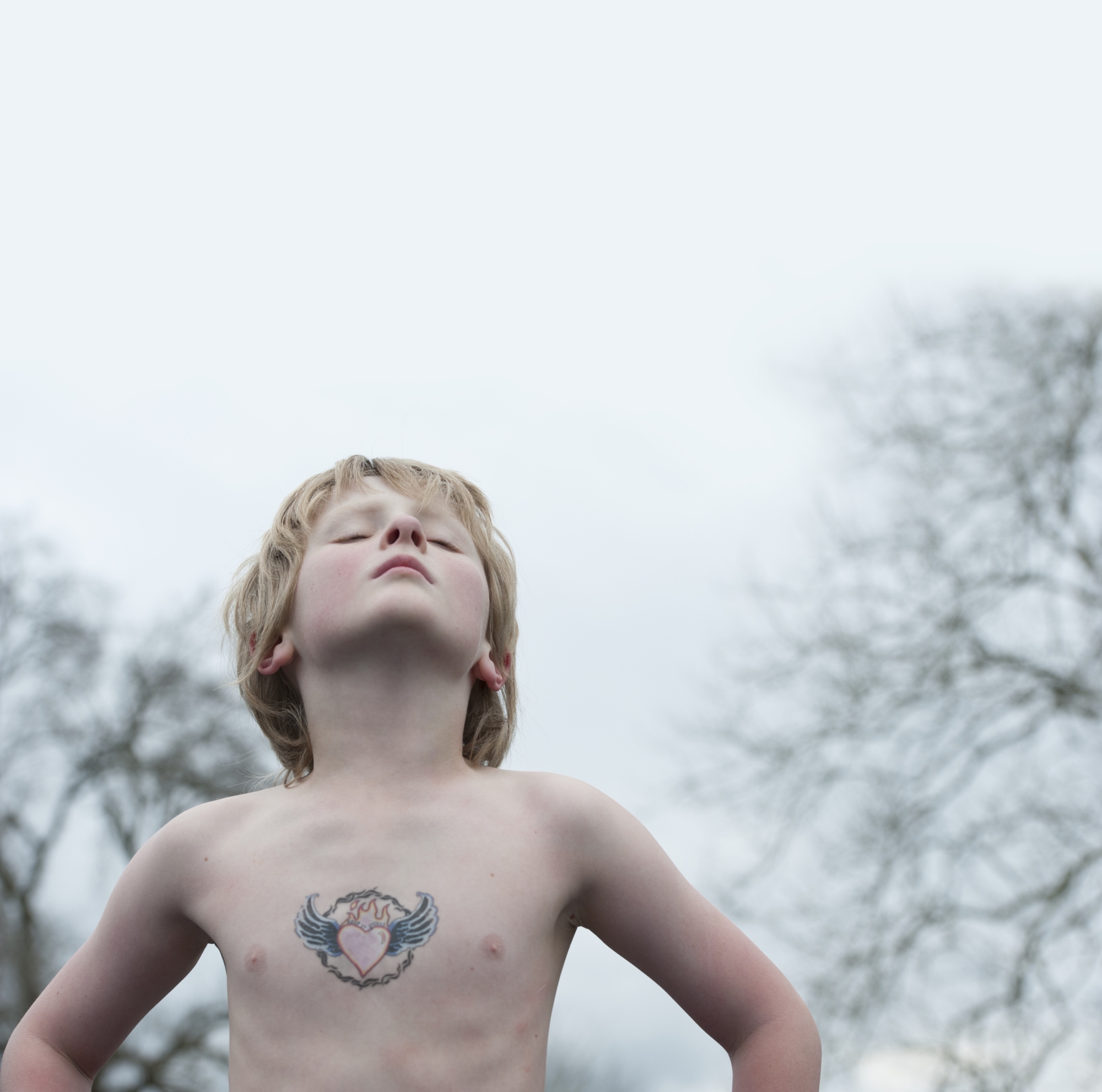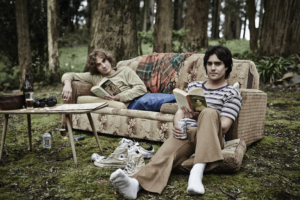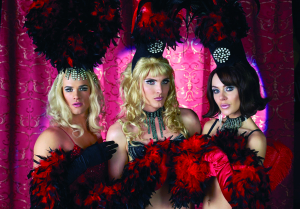‘Over the past five or six years, we’ve had pretty intense debate about marriage equality in Australia,’ says filmmaker Maya Newell, ‘which means that politicians and public figures have been yelling across tables about who’s allowed to marry.’
Opponents keep repeating the argument that marriage is about kids – and kids need a mum and dad. But the funny thing is that gay couples have been having kids for decades. They don’t need anyone’s permission. So I feel that a voice has been missing from the debate. I’m a child of same-sex parents. And my perspective hasn’t been represented.
In 2011, Newell decided it was time to give that voice an airing. She and producer Charlotte Mars began work on their first feature-length documentary, Gayby Baby (2015), which portrays four Australian children – all on the brink of adolescence – of same-sex parents. The film is a follow-up to Newell’s half-hour mini-documentary Growing Up Gayby (2013), which began her exploration of same-sex families, incorporating both the children’s perspectives and those of outspoken critics of marriage equality, such as Fred Nile and Janet Albrechtsen. This time, however, it is the children who get centre stage. ‘The whole film is narrated by the kids,’ Newell explains.
The parents are big parts of the kids’ lives, but we don’t give them any interviews. I think that’s what makes [the documentary] unique – we’ve heard stories about gays fighting for rights and couples trying to conceive, but these are some of the first told from the children’s viewpoints.
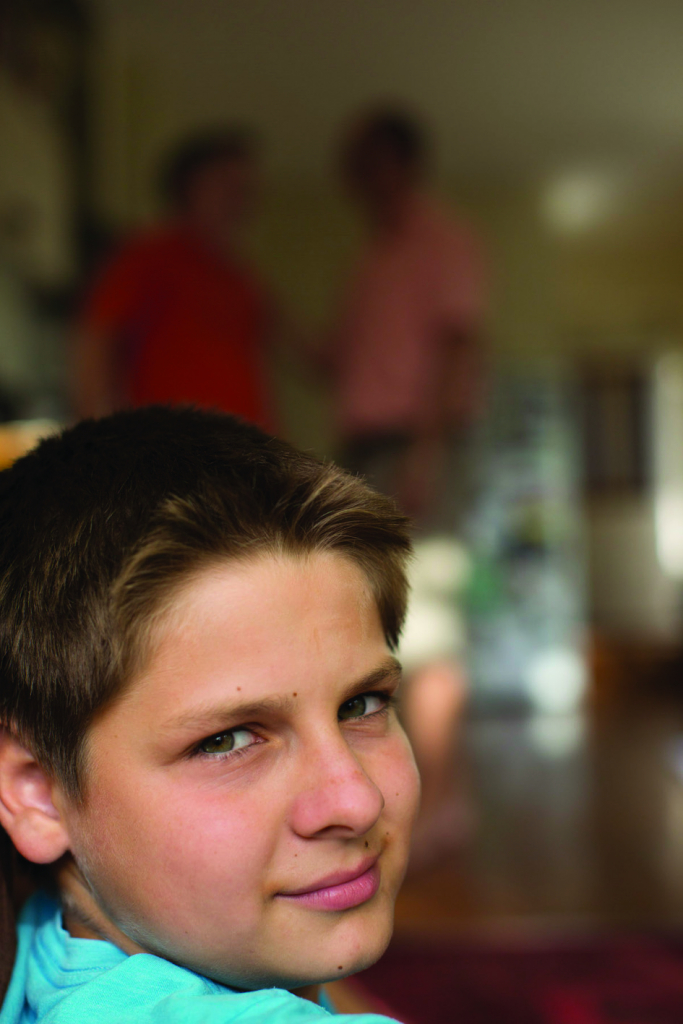
Newell travelled the length and breadth of the nation in search of subjects. She met with more than forty families before deciding on the final four children.
Settling on the right kids wasn’t easy. Firstly, the child and family must agree to be followed around with a camera for a couple of years. Secondly, the camera has to like you in some way, which is not about being attractive. It’s an unspeakable quality. Thirdly, I was looking for subjects who had something important going on – it’s not every moment that we tackle big issues in our lives – and their stories needed to be relevant to having same-sex parents.
In Sydney’s inner west, Newell found Gus, a ten-year-old who, as the director puts it, is ‘totally and utterly obsessed with worldwide wrestling entertainment’ and
coming to an age when he’s thinking about what masculinity means, and what it means to become a man. It’s something that we all go through, but his journey to manhood is being led by his lesbian parents, which makes it just that bit more interesting.
Meanwhile, in Sydney’s western suburbs, Newell discovered Ebony Rose, who
lives in a place where people think a donor is a doughnut, the lawns are beautifully mown and nobody understands her family structure. She dreams of moving to Newtown, which she thinks is a gay haven, so she’s preparing to audition for Newtown Performing Arts High School. Starting secondary school is a transition that we all go through, and it can involve a lot of anxiety. But having gay parents and a feeling of wanting to be accepted makes her story different.
Gayby Baby’s third subject is Matthew, whose mothers, Sandy and Louise, are preparing to represent Australian Marriage Equality and GetUp! at a dinner with Julia Gillard. Furthermore, the family is religious and attends an Anglican church regularly. ‘Matthew is incredibly witty and smart,’ Newell says.
The film focuses on how the family’s plan to have dinner with the prime minister affects him. At the same time, he’s reaching an age at which he feels he has to make a decision about whether he believes in God or not. Suddenly, it’s not just about going along to church with his mums. He’s wondering why they believe in a God who thinks they should be in hell, which is a pretty legitimate conundrum […] Matt’s story is an existential crisis about how to deal with this moral issue in his life.
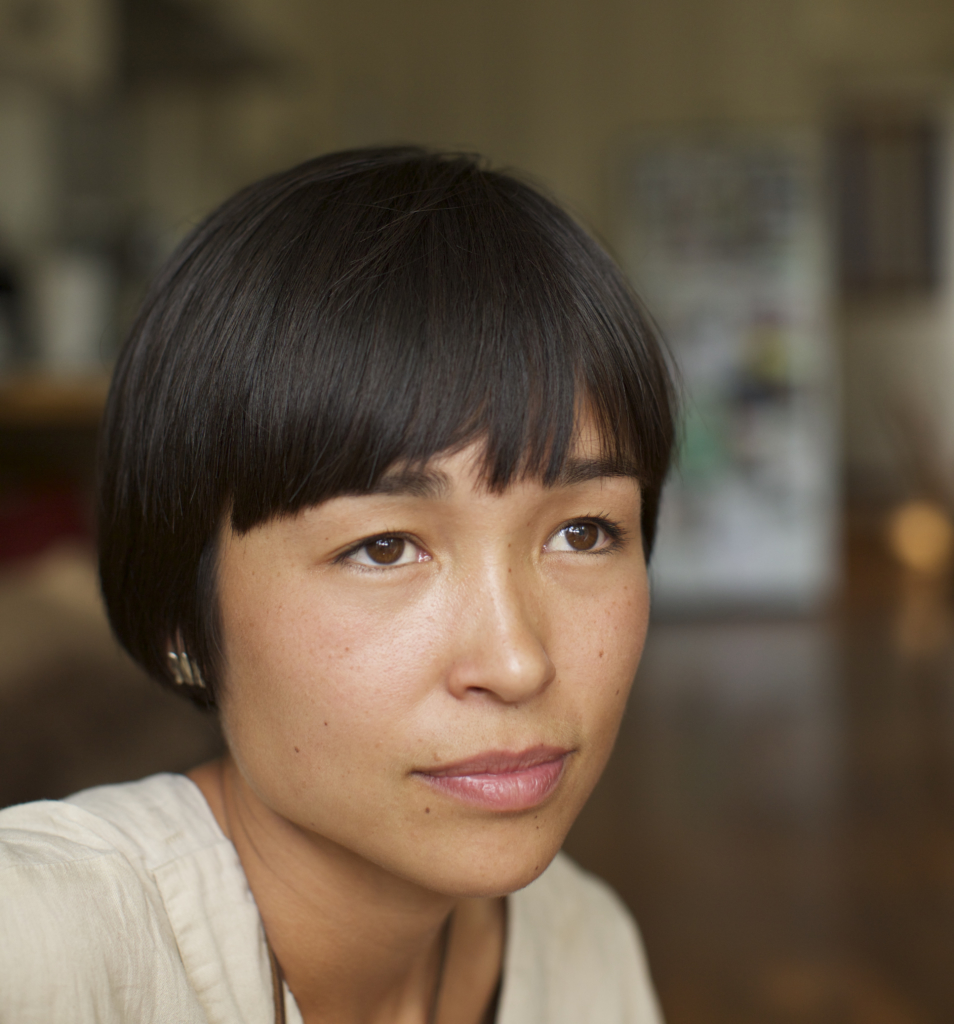
Finally, there’s Graham, who, along with his brother, Michael, was among the first children in New South Wales to be adopted by a gay couple, following the legalisation of same-sex parent adoption in 2010. Like that of Matthew, Graham’s story is two-pronged. On the one hand, he is recovering from a difficult past: ‘Graham was taken away from his first family because of neglect. When he initially went to live with his dads, Matt and Peter, he didn’t know how to speak,’ recounts Newell. ‘So Graham’s story is about overcoming his past and learning to read, with his dads’ support.’ On the other, Graham is coming to terms with a move to Fiji:
The family moved there while we were filming, because of Peter’s job. In the new context, the dads decide it might be inappropriate for their whole family to be out, so they ask the kids to conceal that information until they understand the lay of the land a bit. For Graham, these two complications come to the fore when he’s asked to give a speech about himself and his family to his class.
The debate surrounding marriage equality might have provided inspiration for Gayby Baby, but the film is by no means a polemic. Rather than taking an expository approach, Newell hints at the political context in the opening scenes, then slips into observational mode. ‘The film is not overly political, but the marriage-equality debate did trigger its making,’ she explains.
People have said such horrific, cutting things about gay families and children of gay families in this country – things like, ‘They’ll be damaged,’ and, ‘Boys need a father.’ So I thought that setting the context was important.
‘I’m not interested in telling people what to think or how to feel … With Gayby Baby, we wanted to create a middle space, where people can just watch.’
– Maya Newell
In the film’s establishing shots, the camera pans over a series of family photographs, beginning with formal early-twentieth-century black-and-white portraits and finishing with contemporary colour snaps. According to Newell, this is
a history of the heterosexual family, in a way. For centuries, we’ve had this idea of the family as [comprising] the mother, the father and the children. For a long time, mixed-race families weren’t even considered acceptable. But, right now, we’re living through a unique moment in history. For the first time, if you’re gay, you can have children. You don’t have to question; your parents don’t have to cry because they won’t have grandchildren. During the past ten or fifteen years, there’s been an enormous spiralling-out of our notion of what a family can be, coming out of a very long history of a really narrow view. I wanted to show that continuum.
Simultaneously, the soundtrack includes recorded comments about same-sex families that have been made during public debates about marriage equality. These include Joe Hockey’s statement during the 14 May 2012 episode of Q&A that ‘we’ve got to aspire to give our children what I believe to be the very best circumstances and that’s to have a mother and a father’,[1]Joe Hockey, quoted in ‘Morals and Politics’, Q&A, ABC, 14 May 2012, transcript, <http://www.abc.net.au/tv/qanda/txt/s3497231.htm>, accessed 29 July 2015. and Julia Gillard’s assertion that ‘[she] and the Labor Party have a clear policy […] that [they] won’t be amending the Marriage Act’, made during a community forum held in western Sydney on 11 August 2010.[2]Julia Gillard, quoted in Alexandra Kirk, ‘Gillard and Abbott Questioned at Community Forum’, AM, ABC News, 12 August 2010, transcript, <http://www.abc.net.au/am/content/2010/s2980601.htm>, accessed 29 July 2015. The numerous comments gradually overlap, ascending in volume, giving the effect of several individuals talking at once and culminating in a deafening, chaotic noise. Ironically, the voices of children of same-sex couples are silent in the maelstrom of opinion. Newell tells me that this aims to reflect the child’s experience: ‘That’s what it feels like, when you’re a kid. You can read the front [page] of a paper or listen to the news and, at some point, it just becomes noise.’
However, when the shouting dies down, Gayby Baby provides a space in which the children’s voices can be expressed and heard. Rather than focusing on particular questions, Newell paints an intimate portrait of each child and their family. Viewers see Gus charging into his mums’ bedroom to wake them up on Christmas morning; Ebony explaining that, when she sings, she ‘just forgets about everything else’; Matthew on the football oval at school, working on his AFL skills; and Graham struggling to read the school lunch menu. In watching the subjects go about their daily lives, viewers are left to form their own conclusions. ‘I’m not interested in telling people what to think or how to feel,’ Newell says.
That’s what our politicians do now – they yell about who is right and who is wrong – and I worry about there being no ‘in-between’. With Gayby Baby, we wanted to create a middle space, where people can just watch.
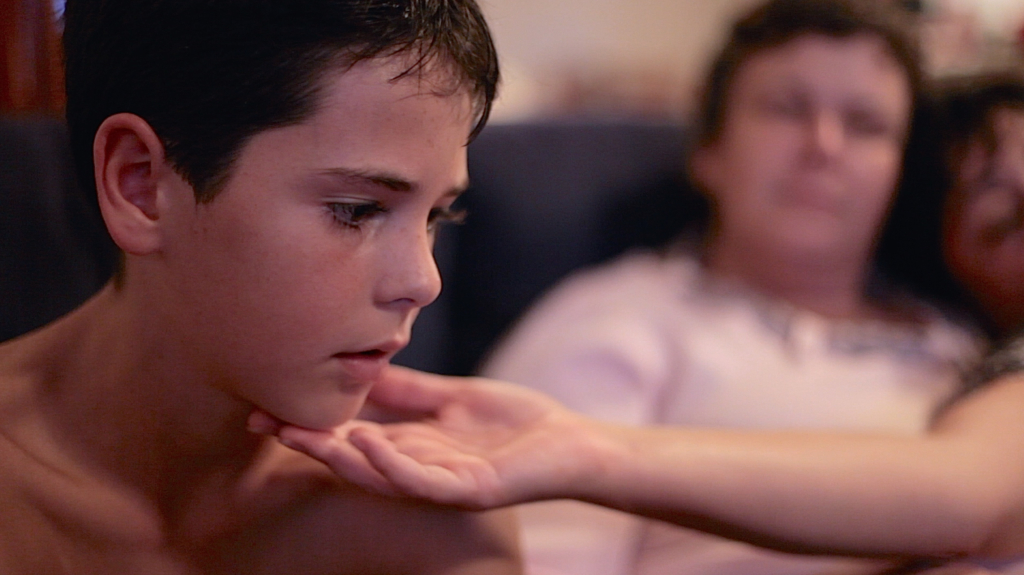
During the shooting period, Newell spent weeks on end living with her subjects. She even accompanied Graham and his family to Fiji during their move. This proximity enabled her to capture numerous complex aspects of their relationship dynamics. Gayby Baby is no shiny advertisement for same-sex families – it depicts problems, disappointments and arguments alongside triumphs, joys and expressions of affection. When Gus asks his mum Amanda for permission to attend a World Wrestling Entertainment (WWE) event ‘when it comes to Australia’, she asserts that she’ll have ‘to discuss it’ with her partner first. When Ebony grows anxious about her audition, she hassles her mum about the need for a ‘back-up plan’. Matthew’s request that he start AFL training on Sundays is refused by his mother, who states, ‘No way, mate. We have a right to have a weekend, too. This is not just about you and, as a mature young man in Year 7, your consideration shouldn’t just be for what you want.’ And Graham’s fathers insist that he write down words he’s unable to read before they give him lunch money.
There are all sorts of moments that make these families perfectly imperfect, like those of all of us. Kids get let down. Parents yell. We wanted viewers to get to know the children, so they could make up their own minds. When I think of every moment that has made me have a change of heart in my life, it hasn’t arisen because someone’s told me to feel a certain way. It’s because I’ve had to work it out for myself or gradually reach a conclusion on my own.
Gayby Baby certainly hit viewers’ hearts hard in April 2015, when it made its world premiere at Canada’s prestigious Hot Docs festival. The film went on to sell out four sessions at the 2015 Sydney Film Festival, and was one of fourteen films to make up the 2015 Melbourne International Film Festival’s Next Gen program. Newell and Mars planned to introduce Gayby Baby to Australia by screening it in hundreds of schools simultaneously on Wear It Purple Day (28 August). ‘It’s exciting, because we’re now in an age when we don’t need big studios anymore, in the way that we have done for a hundred years,’ Newell says. ‘We can release films in our own way through engaged schools and community groups at a grassroots level.’ Her goal is to maximise the film’s social impact.
For me, personally, part of the impetus for making Gayby Baby was the desire to create social change. All the kids we talked to when making the film, and definitely my generation of same-sex families, have experienced the need to hide their families at school, or suffered teasing. I want to help make schools in Australia more open, inclusive, safer places for children from LGBTI families and, more generally, promote a culture of accepting family diversity.
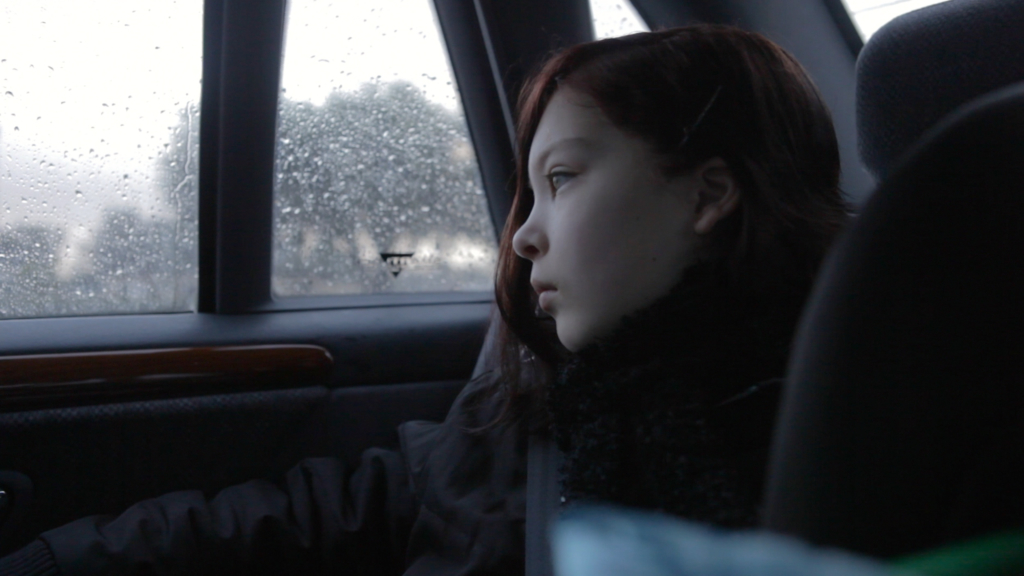
However, in the wake of an inflammatory front-page article in The Daily Telegraph, published 26 August, claiming that Burwood Girls High School’s decision to show the film to 1200 students had incited the anger of ‘parents and community leaders’,[3]‘Gay Class Uproar’, The Daily Telegraph, 26 August 2015, p. 1. New South Wales education minister Adrian Piccoli and Premier Mike Baird banned its screening during school hours. Yet, according to journalist Michael Safi, writing in The Guardian, the Telegraph’s claims were unfounded, as Burwood High received no formal complaints.[4]Michael Safi, ‘Sydney School Received No Complaints from Parents About Gayby Baby Film’, The Guardian, 26 August 2015, <http://www.theguardian.com/world/2015/aug/26/sydney-school-received-no-complaints-from-parents-about-gayby-baby-film>, accessed 31 August 2015. Meanwhile, New South Wales Labor politician Penny Sharpe criticised the uproar in Parliament, stating:
It is time for this to stop […] Being gay, lesbian, bisexual, transgender or intersex is normal. It is called being a human being. Aspiring to have a family is normal. Creating LGBTI families is normal.[5]Penny Sharpe, quoted in Eryk Bagshaw, ‘Gayby Baby: Education Minister Adrian Piccoli and Premier Mike Baird Ban Film Without Seeing It’, The Sydney Morning Herald, 28 August 2015, <http://www.smh.com.au/national/education/gayby-baby-education-minister-adrian-piccoli-and-premier-mike-baird-ban-film-without-seeing-it-20150827-gj8rut.html>, accessed 31 August 2015.
And Victorian Premier Daniel Andrews expressed his support for Gayby Baby via Facebook:
All kids need to know there are lots of different kinds of families, and all kids need to know that the most important thing in any family is love […] If you want to talk about things that confuse and distress young people, let’s talk about telling thousands upon thousands of them that they aren’t ‘normal’. No one deserves that – and it’s just not true. We won’t put up with this kind of cruel rubbish in our state. If any young person is hurt by all this, please know that I stand with you. I’m on your side. So is the Victorian Government.[6]Daniel Andrews, Facebook status update, 27 August 2015, <https://www.facebook.com/DanielAndrewsMP/posts/936946469703223>, accessed 1 September 2015.
Unhindered by the negative press, Newell and Mars proceeded with Gayby Baby’s theatrical release on 3 September in cinemas all over Australia.
We’ve been talking about gay marriage for a really long time. Hopefully, we can now shift the national dialogue from one that’s about couples and individuals, to one that’s more about families and kids. So many people haven’t even considered the existence of us [gaybies]. I think we add a really interesting aspect to the conversation.
http://www.thegaybyproject.com
Endnotes
| 1 | Joe Hockey, quoted in ‘Morals and Politics’, Q&A, ABC, 14 May 2012, transcript, <http://www.abc.net.au/tv/qanda/txt/s3497231.htm>, accessed 29 July 2015. |
|---|---|
| 2 | Julia Gillard, quoted in Alexandra Kirk, ‘Gillard and Abbott Questioned at Community Forum’, AM, ABC News, 12 August 2010, transcript, <http://www.abc.net.au/am/content/2010/s2980601.htm>, accessed 29 July 2015. |
| 3 | ‘Gay Class Uproar’, The Daily Telegraph, 26 August 2015, p. 1. |
| 4 | Michael Safi, ‘Sydney School Received No Complaints from Parents About Gayby Baby Film’, The Guardian, 26 August 2015, <http://www.theguardian.com/world/2015/aug/26/sydney-school-received-no-complaints-from-parents-about-gayby-baby-film>, accessed 31 August 2015. |
| 5 | Penny Sharpe, quoted in Eryk Bagshaw, ‘Gayby Baby: Education Minister Adrian Piccoli and Premier Mike Baird Ban Film Without Seeing It’, The Sydney Morning Herald, 28 August 2015, <http://www.smh.com.au/national/education/gayby-baby-education-minister-adrian-piccoli-and-premier-mike-baird-ban-film-without-seeing-it-20150827-gj8rut.html>, accessed 31 August 2015. |
| 6 | Daniel Andrews, Facebook status update, 27 August 2015, <https://www.facebook.com/DanielAndrewsMP/posts/936946469703223>, accessed 1 September 2015. |
